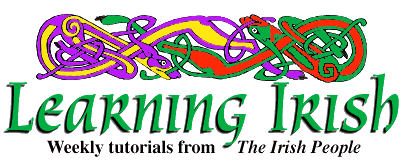
Irish Lesson 41
| PRONUNCIATION EXERCISE Read the phrases below out loud, referring to the pronunciation guide if necessary. When you can read the phrases readily, look at the translation and then go over the phrases again, visualizing the meaning as you say each. PRONUNCIATION EXERCISE Read the Irish passage below slowly without looking at the key below it. Then read it a second time, making use of the key if you are unsure. Do not try to make sense of the words; concentrate on the pronunciation and on grouping the words into phrases: Má tá am agus dúthracht fagadh, an méid a fuair siad, tamall gearr ó shin. Rinne go leor daoine, as ceantair éagsúla, an ráta malartáin gan an bealach a oscailt. Maraíodh le déanaí, strainséirí agus céad acra faoi ghlasraí, ag tagairt don chuairt. Aeráid chineálta mhuirí agus ordóg airtríteach ag mo chomharsa béal dorais. Más monarchana bróg go dtí fuinneog lán píosaí práis, beartaithe ag cuairteoirí. Key: maw* taw* oum AH-guhs DOO-hrahk*t FAW*G-uh, un may*d uh FOO-ir SHEE-uhd, TAH-muhl gyahr oh hin. RIN-ye goh lohr DEEN-uh, as KYAN-tir ay*g-SOOL-uh, un RAW*-tuh mah-luhr-TAW*-in guhn un BAL-uhk* uh OH-skilt. MAHR-ee-oh le DAY*N-ee, strahn-SHAY*R-ee AH-guhs kay*d AHK-ruh fwee GLAHS-ree, uh TAHG-irt duhn K*OO-ahrt. ay*r-AW*-id hyin-AW*L-tuh VWIR-ee AH-guhs ohr-DOHG ar-TREE-tuhk* ag muh K*OH-uhr-suh bay*l DUH-rish. maw*s MUHN-uhr-k*ahn-uh brohg goh dee fwin-YOHG law*n PEES-ee praw*sh, BYAR-ti-he eg KOO-ahr-TYOH-ree. If you are working with someone else, a possible exercise for you is to listen to the other person reading from the original or the key, and to write in Irish what you hear. This will improve your perception of the language as it is spoken to you.
DRILL Go through the present and past tenses of these verbs: Bailigh (BAHL-ee), gather Cuimil (KIM-il), rub Seachain (SHAK*-hin), avoid Freagair (FRAG-ir), answer
For example: Bailím (BAHL-eem), I gather; bailíonn tú (bahl-EE-uhn too), you gather, etc. Bailímid (bahl-EE-mid), we gather; bailíonn sibh, etc. Ní bhailím (nee VWAHL-eem), I don¹t gather, etc. An mbailím? (un MAHL-eem), do I gather?, etc. Nach mbailím? (nahk* MAHL-eem), don¹t I gather?, etc. Bhailigh mé (VWAHL-ee may*), I gathered; bhailigh tú (VWAHL-ee too), you gathered, etc. Bhailíomar (vwahl-EE-uh-muhr), we gathered, etc. Níor bhailigh mé, etc. Ar bhailigh mé?, etc. Nár bhailigh mé?, etc.
The next three ³syncopate², that is, a syllable drops out as you say the forms. It is easier to say the words when this syllable is absent, as you will readily determine.
Cuimlím (KIM-leem), I rub; cuimlíonn tú (kim-LEE-uhn too), you rub, etc. Cuimlímid (kim-LEE-mid), we rub, etc. Chuimil mé (K*IM-il may*), I rubbed, etc. Chuimlíomar (k*im-lee-uh-muhr), we rubbed, etc.
Seachnaím (SHAK*-neem), I avoid; seachnaíonn (shak*-NEE-uhn) tú, you avoid, etc. Seachnaímid (shak*-NEE-mid), we avoid, etc. Sheachain mé (HAK*-in may*), I avoided, etc. Sheachaíomar (hak*-NEE-uh-muhr), we avoided, etc.
Freagraím (FRAG-reem), I answer; freagraíonn (frag-REE-uhn) tú, you answer, etc. Freagraímid (frag-REE-mid), we answer, etc. D¹fhreagair mé (DRAG-ir may*), I answered, etc. D¹fhreagraíomar (drag-REE-uh-muhr), we answered, etc.
This finishes the extensive drill for the present and past tenses. We will do work on the irregular verbs in present and past tenses next.
CONVERSATION Pól (pohl): Dia duit, a Úna. Úna (OON-uh): Dia¹s Muire duit, a Phóil (FOH-il). Conas tá tú inniu? Pól: Bhí slaghdán (sleye-DAW*N) trom (truhm) orm inné, ach anois tá biseach (BI-shahk*) orm. Conas tá tú féin? Úna: Tá mé go maith, buíochas le Dia. Tá súil agam (SOO-il) uh-GUHM) go bhfaca tú an díospóireacht (dee-SPOH-i-rahk*t) mhór (vwohr) ar an teilifís aréir. Pól: Ní fhaca mé rud ar bith, Bhí mé i mo chodladh (muh K*UH-luh) ó sheacht a chlog go maidin. Cad a tharla sa díospóireacht mhór? Úna: Ó, labhair an feirmeoir (FER-i-moh-ir) leis an aisteoir (ash-TYOH-ir) le linn (le lin) uaire fada (OO-ir-e FAH-duh), ach níor thuig (hig) mé mórán de. Chuir (k*ir) siad tinneas cinn (TIN-yuhs kin) orm leis na focail mhóra (FOH-kil VWOHR-uh), na smaointe casta (SMWEEN-te KAHS-tuh), agus na figiúirí fada (fig-YOO-i-ree FAHD-uh). Pól: Ná bac leis. Tuigim iad, ar ndóigh (er NOH-ee), agus míneoidh mé (meen-YOH-ee may*) duit gach rud. Úna: Go raibh maith agat (GU-ruh mah huh-GUHT), a Phóil. Fear cliste tusa, gan amhras (OU-ruhs) ar bith.
Hello, Una. Hello, Paul. How are you today? I had a heavy cold yesterday, but now there¹s improvement on me. How are you? I am well, thank God. I hope that you saw the big debate on television last night. I didn¹t see a thing. I was asleep from seven o¹clock until morning. What happened in the big debate? Oh, the farmer talked with the actor during a long hour, but I didn¹t understand much of it. They gave me a headache with the big words, the involved thoughts, and the long figures. Don¹t worry about it. I understand them, of course, and I will explain everything to you. Thank you, Paul. A clever man you are, without any doubt.
Notes: A headache is ³put on² a person, rather than ³given² to him. ³Focal mór², a big word, but ³focail mhóra² (VWOHR-uh), big words.
(c) 1997 The Irish People. May be reprinted with credit. |